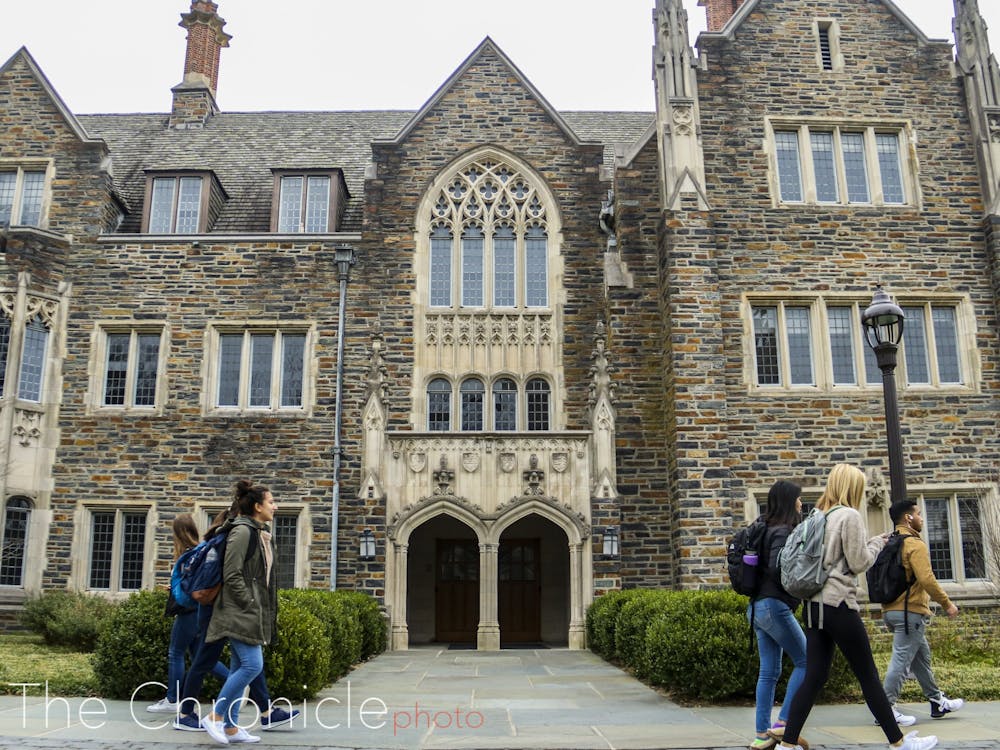Applications for the coveted undergraduate Young Trustee position go out this month, and potential candidates will find that the redesigned selection process is less democratic than in years prior.
In the past, the Young Trustee Nominating Committee selected finalists from the applicant pool and the undergraduate student body elected the Young Trustee in an online vote. Starting this year, a nominating committee and Duke’s president will select the next Young Trustee from among the finalists, to be confirmed by the Board of Trustees.
The essence of the changes to this process is that “it’s not in [Duke Student Government’s] hands anymore,” said Duke Student Government President Tommy Hessel, a senior.
“Our primary goals were to increase awareness and understanding of the Young Trustee position, enhance transparency to ensure fairness and inclusion, and align with best practices in board governance for private universities,” Margaret Epps, secretary to the Board of Trustees and chief of staff to President Vincent Price, wrote in a message to The Chronicle.
In previous Young Trustee election cycles, the YTNC membership was chosen by the University secretary and the DSG President. Any undergraduate student other than the DSG President was able to apply to be on the YTNC.
Beginning this year, the nominating committee for the Young Trustee is selected by the secretary to the Board of Trustees and chief of staff to the Duke president, currently Epps. The selection committee consists of eleven undergraduate students, including the DSG President and one other DSG member; two current Young Trustees; and the assistant secretary to the Board of Trustees, who will serve as committee secretary.
Of the undergraduates, five members of the redesigned YTNC are representatives of campus identity or affinity groups. Two undergraduate committee members were selected from among students currently serving on a committee or task force for the Board of Trustees. The final two students are at-large members who were selected through an open application process.
Young Trustee applications will be sent to the undergraduate student body in early February. After undergoing bias training, the YTNC will review all applications and select two to four finalists.
Instead of directly casting votes for Young Trustee, students this year will instead have the opportunity to meet the finalists and ask questions through a virtual forum.
During the forum, the finalists chosen by the nominating committee will each have a chance to present their case as to why they should be selected in front of an assembly of their peers.
Any student who attends the forum or watches a recording will be able to fill out a feedback form. The YTNC will utilize any student feedback in their final deliberations before submitting its official recommendation to the University president, Vincent Price.
Price will consider both the student feedback from the virtual forum and the final nomination of the YTNC before submitting his own recommendation for Young Trustee. The Board of Trustees will have the final say in approving or rejecting this candidate.
The proposed revisions were sent out to the student body in an email from Epps on Nov. 5, 2020, and were later ratified by DSG.
Epps stressed that her office worked closely with Hessel as well as the president of the Graduate and Professional Student Government. The selection process for graduate and professional Young Trustees underwent very similar revisions.
The new selection process was “approved by the last three Trustees, Amy Cramer [Trinity ‘18], Trey Walk [Trinity ‘19] and Ibrahim Butt [Trinity ‘20]” according to Hessel, all of whom “actually reviewed it and helped craft it.”
The intent is to “basically switch over from this larger process of being a student and being a representative,” said Hessel, to something “closer to what the position’s supposed to align to … [as] a fiduciary and student alumni.”
Hessel added that Young Trustees are not supposed to be representatives of a “single constituency” but rather of the university as a whole; by not being chosen via direct election, a YT can be “a young voice in the committee, not a student.”
Get The Chronicle straight to your inbox
Sign up for our weekly newsletter. Cancel at any time.

Parker Harris is a Trinity senior and an editor at large of The Chronicle's 118th volume.

